Webinar: Treating Toe Walking and Connecting the Sensory Dots

Date and Time
May 6, 2020
1–2 p.m. ET
Location
Virtual Event
Idiopathic toe walking, if not treated, can sometimes lead to problems with a child’s leg and foot as they get older. Early classification and intervention for your patient, can help formulate a treatment plan that supports both the primary (i.e. sensory based) and secondary (i.e. musculoskeletal) reasons for toe walking. This course will deepen the learner’s insight into various factors that contribute to toe walking as well as discuss the importance of collaboratively identifying a well-rounded treatment plan. The earlier a child has intervention for physical, emotional and educational abnormalities, the better the outcome.